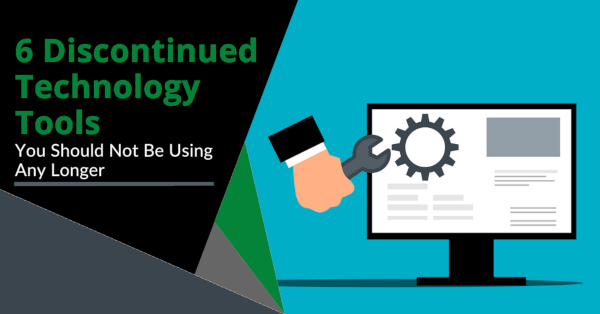The one constant thing about technology is that it changes rapidly! Things that were once shiny and new can now be ancient and obsolete. New versions replace those old obsolete tools and the continued use of old technology can leave computers and networks vulnerable to attack.
While that older technology may still run fine on your systems and satisfy your requirements it doesn’t mean that it is still okay to use. One of the biggest dangers of using outdated technology are that they can leave security holes in your systems that can lead to a data breach as outdated technology no longer receive vital security updates. Updates can patch system vulnerabilities and unpatched software and hardware means a device is a sitting duck for a cybersecurity breach.
About 1 in 3 data breaches are due to unpatched system vulnerabilities.
A further problem with using discontinued technology is that it can leave you behind. Some very important reasons to keep your technology updated to a supported version are:
- Reduce the risk of a data breach or malware infection.
- To keep your good reputation in tact and foster customer trust. Using old technology can make your business looking like you are in the stone ages to your customers, and they can their lose faith and trust in you.
- Meet data privacy compliance requirements.
- To be competitive in your market.
- To enable employee productivity. Older systems are clunky and get in the way of employee productivity. If you keep these older systems in use, it can lead to the loss of good team members due to frustration. 49% of surveyed workers say they would consider leaving their jobs due to poor technology.
- To help mitigate hardware and software compatibility issues.
Get Rid of The Following Tech Now If You Are Still Using It
1. Windows 7 and Earlier
Windows 7 was a very popular operating system, but it has now gone the way of the dinosaur and has been replaced with Windows 10 and Windows 11. The Windows 7 OS lost support on January 14, 2020.
While it will still technically run, it is now very vulnerable to hacks. Thus hackers are actively looking for systems still running this obsolete version of Windows as it provides an easy “low hanging fruit” target.
2. macOS 10.14 Mojave and Earlier
Due to the high cost of iMacs and MacBooks, users tend to hang onto them as long as they can. But once these devices get to a certain point, they can no longer install any updates. This then leaves the hardware stuck on an older and non-supported macOS version.
If you are running macOS 10.14 (AKA Mojave) or earlier, then your system is no longer supported by Apple, and you need to upgrade to a whole new system.
3. Internet Explorer
Internet Explorer or IE for short, used to be the #1 browser in the world. Over time though, Google Chrome and other browsers edged it out, including its replacement, Microsoft Edge.
Microsoft began phasing out IE with the introduction of Microsoft Edge in 2015. In recent years, fewer applications have been supporting use in IE. The browser lost all support beginning on June 15, 2022.
If you are using Internet Explorer move to another browser ASAP.
4. Adobe Flash
It seemed like every other website used Adobe Flash in the early 2000’s. But other tools can now do the animations and other neat things Flash could do. This made the tool obsolete, and Adobe ended it.
The Adobe Flash Player lost all support, including security updates, as of January 1, 2021. Do you still have this lingering on any of your computers? If so, you should uninstall the browser plugin and any Flash software.
5. Adobe Shockwave
Adobe Shockwave was a popular in multimedia platforms for interactive applications and video games. Adobe discontinued it on February 1 2017 and dropped all support for Shockwave on April 9, 2019.
As technologies evolve and the use of mobile devices has grown, interactive content has moved to platforms such as HTML5 Canvas and Web GL, usage of Shockwave has declined and any installations should be removed.
6. Microsoft SQL Server 2014
A popular database tool is Microsoft’s SQL and if you are using SQL Server 2014, then mainstream support has already ended. In July of 2024, all support, including security updates will stop.
This gives you a little more time to upgrade before you’re in danger of not getting security patches. But, as with most things, it is better to upgrade sooner rather than later. An early upgrade will also leave plenty of time for testing and verification of the upgrade.
Need Help Upgrading Your Technology & Reducing Your Risks?
IT in general can be scary and upgrades even more so, especially if everything has been running great. You may be afraid that a migration or upgrade will cause issues and are not confident enough to perform the upgrades yourself. Don’t worry, we can help you upgrade your technology smoothly and do thorough testing afterward. Don’t wait until it is too late, contact us today to schedule a technology review with us.

